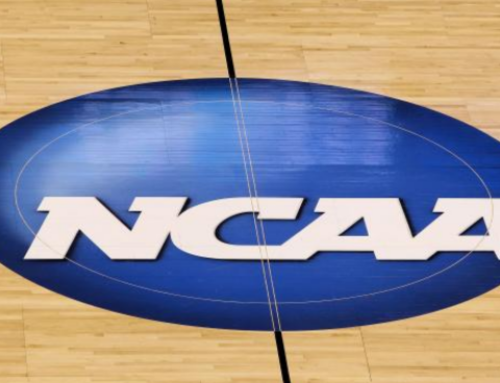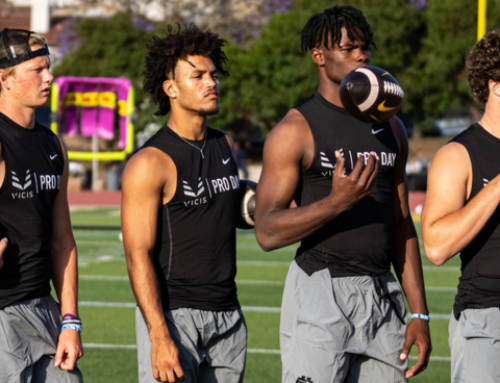How Guidance Counselors Affect the Recruiting Process
Believe it or not, high school guidance counselors can play a major role in your journey to play college sports. A counselor can be an asset or a detriment, depending on his or her knowledge, experience and willingness to assist in the process. It is essential that both students and their parents reach out to their school counselor, more than once if necessary, until all parties involved truly understand their responsibilities during the rigorous recruiting process.
Most high school counselors can attest that they never heard the words “recruiting,” “NCAA” or “athletic eligibility” during their graduate school training. So, unless your counselor personally went through the recruiting process or has spent years working closely with athletes, it’s likely he or she doesn’t know how the NCAA Eligibility Center process works. (Introduce your counselor to the STACK Recruiting Guide—it’s a great resource for navigating the recruiting process.)
To circumvent issues, you must develop a relationship with your guidance counselor and make certain that he or she understands your future aspirations regarding college athletics. Also, your parents need to develop a relationship with your counselor, since they will be in fairly regular contact.
To get the recruiting process rolling, your parents must release your transcript and standardized test scores via a signed letter, fax or email to your counselor. In this letter, your parents should include an email address and ask the counselor to notify them if and when a college requests your transcript or scores. This way, your parents will be made aware of which colleges are showing genuine interest in you. As the end of the school year approaches, you may also want to request copies of your transcript, so when you visit colleges during the summer months, you can provide a copy directly to the coaching staff.
As junior year begins and you register with the NCAA Eligibility Center, your counselor (again, upon request) must forward to the Center not only your transcript but also an updated edition of your school’s course catalog. Not having this vital information on file may slow your recruiting process after you graduate high school and jeopardize your eligibility and scholarship chances. When your final transcript is complete (which happens after you graduate), your counselor must forward it to the NCAA with your NCAA ID number (provided by NCAA Eligibility Center). Your date of graduation must be included on the final transcript as well. You may need to be diligent in these reminders, because some counselors terminate their relationships with students once they’ve graduated. If you’re having trouble working with the counselor, your high school athletic director is another great option.
In conversations with college coaches over the years, we’ve often been disturbed to hear that a student-athlete was moved from the “A” recruiting list to a “B” list, or even removed from consideration, because a school counselor failed to return a phone call, send a transcript or forward a standardized test score. College coaches usually recruit several athletes at a time. If they do not hear from an athlete, sometimes they just move on to the next one. College recruiting is personal for the athlete but more of a business for college coaching staffs. To make this stressful time go as smoothly as possible, everyone needs to work together.
Photo: loyolahs.edu
THR College Planning is one of the nation’s premier recruiting and placement programs. THR specializes in leveraging financial opportunities in the educational market. Academic development, financial aid assistance and athletic placement are keys to a successful THR plan. On average, THR has facilitated awards of $92,000 in scholarship money over four years. For further information, send an email to [email protected] or call 1-855-847-4723 (THR GRAD).
RECOMMENDED FOR YOU
MOST POPULAR
How Guidance Counselors Affect the Recruiting Process
Believe it or not, high school guidance counselors can play a major role in your journey to play college sports. A counselor can be an asset or a detriment, depending on his or her knowledge, experience and willingness to assist in the process. It is essential that both students and their parents reach out to their school counselor, more than once if necessary, until all parties involved truly understand their responsibilities during the rigorous recruiting process.
Most high school counselors can attest that they never heard the words “recruiting,” “NCAA” or “athletic eligibility” during their graduate school training. So, unless your counselor personally went through the recruiting process or has spent years working closely with athletes, it’s likely he or she doesn’t know how the NCAA Eligibility Center process works. (Introduce your counselor to the STACK Recruiting Guide—it’s a great resource for navigating the recruiting process.)
To circumvent issues, you must develop a relationship with your guidance counselor and make certain that he or she understands your future aspirations regarding college athletics. Also, your parents need to develop a relationship with your counselor, since they will be in fairly regular contact.
To get the recruiting process rolling, your parents must release your transcript and standardized test scores via a signed letter, fax or email to your counselor. In this letter, your parents should include an email address and ask the counselor to notify them if and when a college requests your transcript or scores. This way, your parents will be made aware of which colleges are showing genuine interest in you. As the end of the school year approaches, you may also want to request copies of your transcript, so when you visit colleges during the summer months, you can provide a copy directly to the coaching staff.
As junior year begins and you register with the NCAA Eligibility Center, your counselor (again, upon request) must forward to the Center not only your transcript but also an updated edition of your school’s course catalog. Not having this vital information on file may slow your recruiting process after you graduate high school and jeopardize your eligibility and scholarship chances. When your final transcript is complete (which happens after you graduate), your counselor must forward it to the NCAA with your NCAA ID number (provided by NCAA Eligibility Center). Your date of graduation must be included on the final transcript as well. You may need to be diligent in these reminders, because some counselors terminate their relationships with students once they’ve graduated. If you’re having trouble working with the counselor, your high school athletic director is another great option.
In conversations with college coaches over the years, we’ve often been disturbed to hear that a student-athlete was moved from the “A” recruiting list to a “B” list, or even removed from consideration, because a school counselor failed to return a phone call, send a transcript or forward a standardized test score. College coaches usually recruit several athletes at a time. If they do not hear from an athlete, sometimes they just move on to the next one. College recruiting is personal for the athlete but more of a business for college coaching staffs. To make this stressful time go as smoothly as possible, everyone needs to work together.
Photo: loyolahs.edu
THR College Planning is one of the nation’s premier recruiting and placement programs. THR specializes in leveraging financial opportunities in the educational market. Academic development, financial aid assistance and athletic placement are keys to a successful THR plan. On average, THR has facilitated awards of $92,000 in scholarship money over four years. For further information, send an email to [email protected] or call 1-855-847-4723 (THR GRAD).
RECOMMENDED FOR YOU
Create A Free Recruiting Profile Today!
CaptainU helps athletes & parents not only be proactive but also to manage and take control of their entire recruiting journey.










